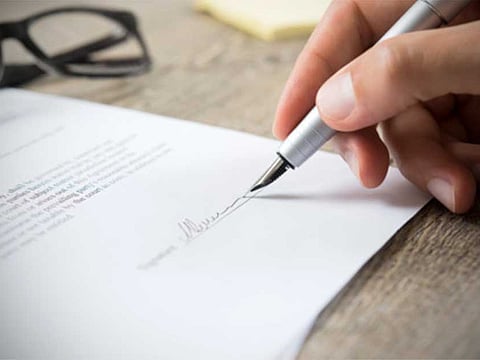Why signatures matter
Your name, written in your hand, is part of your identity

When I heard this week that most credit card transactions soon won’t require a signature, I was reminded of an experiment I once conducted. Curious to see if I would recognise their handwriting, I asked four friends to send me a postcard, each with the same greeting: “Having a wonderful time. Wish you were here.”
My guinea pigs included a real estate agent, an architect, a fellow journalist and a porn star. My score? A big old zero: I couldn’t identify a single one.
Handwriting, once one of the most instantly identifiable elements of an individual, seems to have been lost to the ages, trampled into dust under the relentless advance of keyboards, touch screens and voice recognition software. Now the signature — the crown jewel of penmanship — is headed for the same ash heap. With the stroke of a virtual pen, American Express, Discover, Mastercard and Visa pronounced that even our laziest scrawling John Hancocks are no longer needed.
Am I surprised? Not one iota.
After all, Americans now send millions of holiday e-cards, and birthday greetings arrive mostly via Facebook. Emails have largely replaced personal letters. Even that marathon of document signing, the house closing, has moved on: When I bought a home last year, I never once put pen to paper. I used DocuSign, which creates a valid legal “signature.” DocuSign’s website trumpets its benefits: “Sign documents anywhere from any device”; “No overnighting, faxing or waiting”; and, of course: “More secure than paper.” (Not so much on that last one — in May 2017, DocuSign admitted that a database of customer email addresses had been breached in a phishing campaign.)
Even in an age of dizzying change, this one feels like a real loss. It’s been a long time since I actually signed my name to a cheque, which I used to do with a sense of pomp and circumstance, always careful to make the “t” in “Steven” parallel to the one in “Petrow,” always placing an emphatic period after the “w” in my last name, my old-school form of encryption. Each signature was an original creation. Although I’m pleased by how quickly I can pay my bills now, every time I open the bank app on my phone I feel my identity eroding, replaced by routing and account numbers.
Some years ago I decided to organise a lifetime’s worth of papers, which included handwritten notes, letters and postcards from my parents, my first girlfriend and first boyfriend, as well as some famous folks, including Senator Joe Biden, Mayor John V. Lindsay of New York and the tennis champ Billie Jean King. Each of them had its creator’s unique signature.
I particularly treasure the letters from my maternal grandmother. At the upper left of each envelope she would write out her name, Marjorie L. Straus, in classic cursive. Even before I could read I knew those curves and curlicues equalled my grandma. The dozens of cards and notes from her are all signed exactly the same way, “Love, Grandma.” The “L” and the “G” were original to her hand. I would have known her signature anywhere, and when I see it today I’m reminded of so much more: Her hair. Her perfume. How we watched The Mary Tyler Moore Show together on Saturdays. Her nightly soda beverage (which she always let me sip).
Grandma died in 1973; she lives on eternally through her penmanship. I also still have the five-page letter my mother wrote me in 1981, shortly after I told her I was gay. She starts out in her usual formal hand, but as she goes on the pen quivers and she strays outside the lines. That told me so much more about her inner monologue — her fears for me — than her actual words.
The same message in an email would have provided no clues as to her state of mind. By the time she penned a jittery “Love, Mum,” I knew that her caring was very real even if she hadn’t yet accepted my sexual orientation.
According to one Mastercard executive, “the signature has really outrun its useful life.” Granted, technological advances long ago made our scrawls obsolete as a protector of personal security. But not for a moment do I believe the signature has no life left in it. To credit card companies, a chip is about to become my identity, with no signature necessary. Bit by byte, our identities get erased, and along with them our humanity. But I’ll treasure my papers, and my signature.
— New York Times News Service
Steven Petrow is an author, journalist, and syndicated columnist.
Sign up for the Daily Briefing
Get the latest news and updates straight to your inbox


